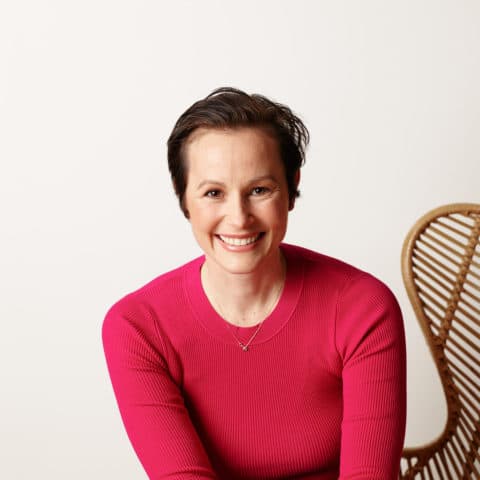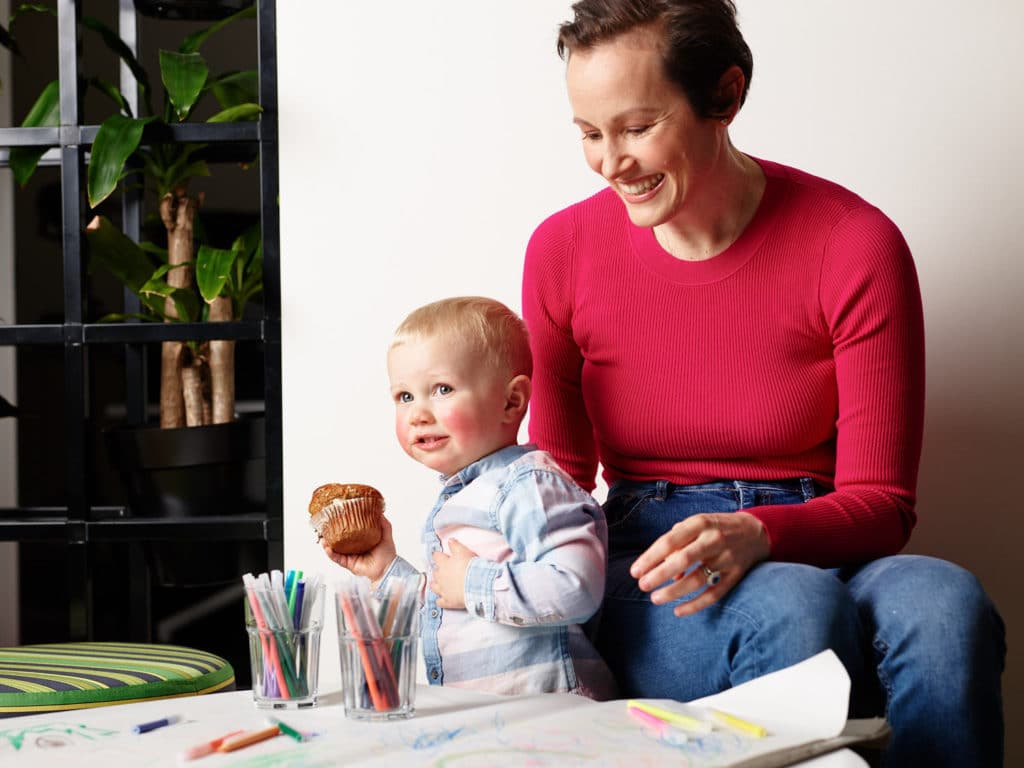Breast Cancer As A Young Woman
Rebecca Angus was 33 years old and breast feeding when she found a lump.
She assumed it was mastitis, a common condition in breastfeeding women which causes the breast tissue to become painful and inflamed but didn’t delay in seeing her GP.
She was shocked to find out she had breast cancer.
“My son was 11 months old at the time, so I had just recently come back off maternity leave to resume my position as a podiatrist at my practice.”
“As soon as I did feel that lump, I was straight to the doctor, assuming I had mastitis or scar tissue, secondary to the mastitis.”
Rebecca said she asked for an ultrasound, which she got the same day as well as a biopsy and mammogram.
“Within 24 hours I had my General Practitioner on the phone telling me that I had breast cancer.”
Her diagnosis came as a huge shock as, being a young woman, she wasn’t thinking about her breast cancer risk.
“I found when I was first diagnosed, in the beginning, I was made out to be sort of a white rhino, because it’s not as common in younger people to get breast cancer.”
“So, we were in this area of unknown territory as to whether or not my treatment was going to be successful which was a challenge.”
She said her treatment began within a week of her diagnosis.
“Probably a week after my surgery, I was at my sons first birthday and I had a drain in my back and a lot of people still didn’t know at that stage that I had breast cancer.”
“I didn’t really tell people I had breast cancer until I knew all the information, because I really wanted to be able to answer the questions that they had properly and then within three weeks.”
“I had AC and paclitaxel and Herceptin. So, I am really grateful for Breast Cancer Trials research, and for Herceptin because I know of people and have spoken to people where their family members had to pay for the drugs. So, I am so grateful now that it is subsidised.”
Herceptin was proven to significantly reduce the risk of breast cancer returning for women with HER2-positive breast cancer, through the Breast Cancer Trials HERA clinical trial. It provided a new hope for women with HER2-positive breast cancer and changed practice around the world.
Listen to the Podcast
Rebecca Angus talks about her cancer diagnosis on the Breast Cancer Trials Podcast.
Rebecca said having the support of her family and medical team was invaluable.
“My oncologist was amazing. the first thing she said to me was ‘can you afford to keep your child in childcare?’ and I said yes.”
“So, my son was basically in full time childcare throughout my treatment.”
“I was unable to work for some of my treatment due to neutropenia and I had a few hospitalisations and working in the health area meant that I was exposed to patients more.”
Rebecca said she was in a position that meant she could continue to afford childcare throughout treatment, but other young women are not so lucky, and she’d like to see more support for people in this position.
“I was grateful I could afford that healthcare and childcare but for some women that might be difficult.”
“In the beginning my lovely childcare facility gave me a form and said ‘Rebecca will you fill this out’, and it was a form to give me 12 weeks of subsidised care, and that was lovely, except for the fact it did on top of it have a comment about being unfit and I just wouldn’t sign that form for the life of me, I just couldn’t do that.”
“I really do see some need for change around some of the supports around childcare particularly with women who do have breast cancer, or any type of cancer that we do look at trying to help them a little bit more because at the end of the day we’re not unfit, we’re just unwell and sick because of the disease.”
She said she’s amazed at how well her son understood her situation.
“My son is amazing. I think children are incredibly resilient.”
“He is very well adjusted and a beautiful little boy,” she said.
“I tried not to focus on the things I couldn’t do, we just worked on the things I could, and I did a lot of reading with him.”
“But it is hard.”
“It’s hard when your diagnosed early, because for young women, as we’re in a smaller population group, there’s not as many support services around.”
Knowing Your Beast Cancer Risk
Rebecca said she would like to have known about her breast cancer risk earlier and now advocates for young women to become more breast aware.
“I would really love to see more prevention techniques for young women with breast cancer.”
“I would like to see, particularly around the stage when women are having breast changes through pregnancy and lactation, that they are checking their breasts or asking practitioners to check their breasts.”
“We can also use tools like iPrevent to try work out ways in which we can reduce our risk or flag risk so we are going and getting the education off the health practitioners to try and get the right information.”
Rebecca’s Advice: Don’t Be Afraid to Ask for Help
Rebecca said taking care of your mental health is important throughout treatment, especially as a young women who may feel like they’ve been struck down in their ‘prime’.
“I think the most important thing to suggest to young people with breast cancer with a family is to ensure that they get good help from a psychologist.”
“I had another friend who had a young family with a different type of cancer and the first thing she said to me was it is really important that you go and speak to someone,” she said.
“I think that was really important for my overall wellbeing but also it has helped me get back to work quicker.”
Support Us
Help us to change lives through breast cancer clinical trials research




